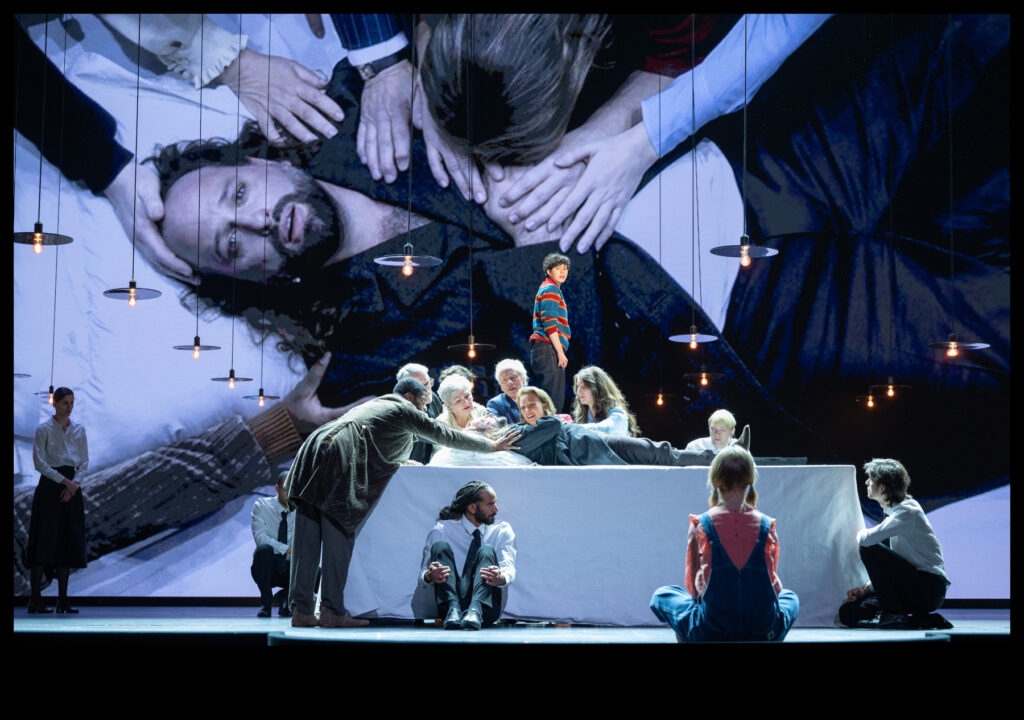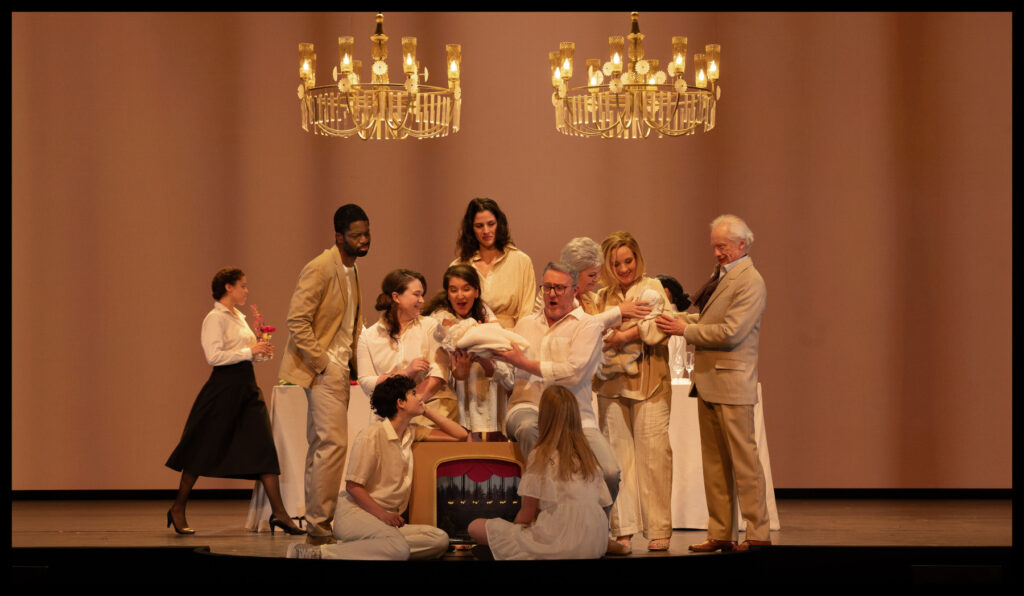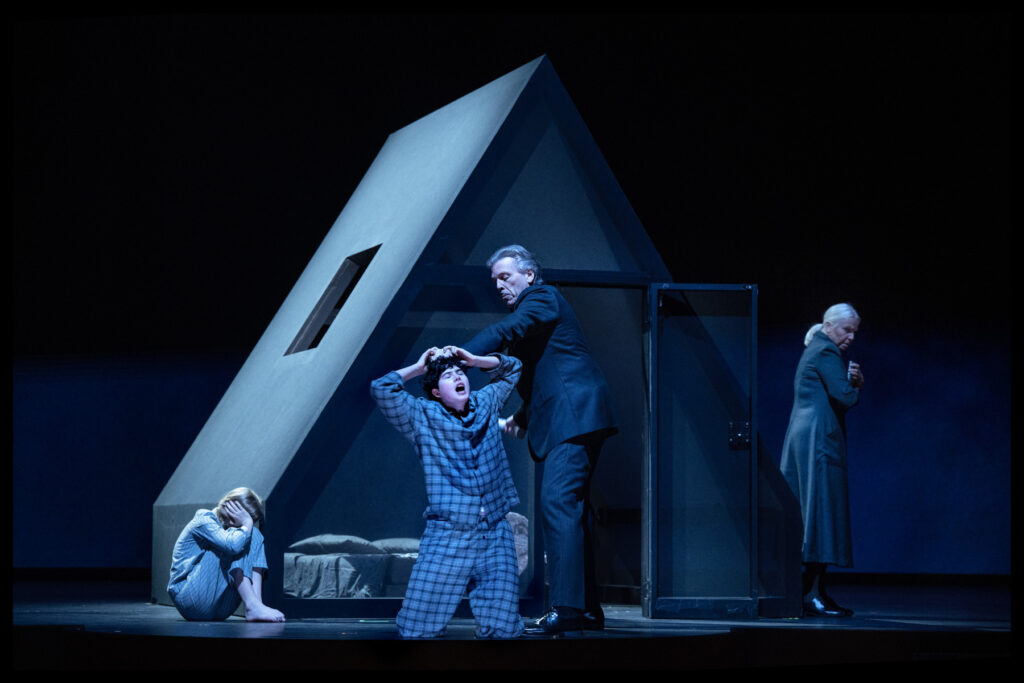Not only are Ingmar Bergman’s films very ‘operatic’ in their poetic but visceral way of dealing with matters of life and death, opera as an art form had a place in the Swedish director’s life and work. His 1975 film of Die Zauberflöte has achieved classic status and as a theatre director he staged The Rake’s Progress, The Threepenny Opera and The Merry Widow – later he even considered making a film of Lehár’s operetta with Barbra Streisand and Al Pacino. In the 1990s he collaborated on a libretto set by the Swedish composer Daniel Börtz. Several of his films have been adapted for the operatic stage and his 1955 comedy Smiles of a Summer Night became the source for Stephen Sondheim’s A Little Night Music.
Bergman saw Fanny and Alexander (1982) as “a summing-up of my entire life as a filmmaker” and its scale and scope are ambitious: the cast is large, the scenes of a family Christmas and christening in the early 1900s are memorably lavish, and the full-length TV version lasts five hours. The cinema cut is closer in length to Mikael Karlsson’s new ‘grand opera’ Fanny and Alexander, composed to a succinct English libretto by Royce Vavrek and running to 160 minutes of music. This is not the team’s first transformation of a film by a major Scandinavian director: Melancholia,drawing on Lars von Trier’s end-of-days drama, received its first staging in Stockholm in 2023.

Ivo Van Hove, director of La Monnaie’s world premiere of Fanny and Alexander, brings strong Bergman credentials to the endeavour, having adapted four of his films for the theatre. Working with the designers Jan Versweyveld (sets and lighting), An D’Huys (costumes) and Christopher Ash (video), he does not seek to replicate the visual language of the cinematic Fanny and Alexander. First and foremost, the action is updated to the present day. This does not heighten its immediacy, but it does weaken the intensity of the plight faced in Act 2 by Emilie Ekdahl, the recently widowed mother of Alexander and his younger sister Fanny. When her charismatic new husband, Bishop Edward Vergerus turns out to be an abusive hypocrite, he refuses to divorce her. Would a woman in modern Sweden find herself so powerless?
The Ekdahl Christmas – hosted by the worldly and generous-hearted matriarch Helena in the form of Susan Bullock, who launches proceedings with a wordless melody that is reassuringly reprised at the final christening – takes place entirely around a table set before a thicket of conifers. An episode of claustrophobic desolation in the film, the bedroom scene between Helena’s self-hating son Carl and his long-suffering wife Lydia, becomes far less bleak when played in the symbolic open air by two rising singers glowing with physical and vocal health, Justin Hopkins and Polly Leech. Crucial evidence of the family’s professional theatricality is provided by Peter Tantsits as Oscar, the children’s actor-manager father. In the film he strikes a somewhat mournful figure; at La Monnaie his fatal collapse during a rehearsal of Hamlet gains shock value in the light of Tantsits’ high-octane tenorial pzazz. This is the first scene to make prominent use of video, a driving force for the metaphysical excursions later in the opera: the image of the supine Oscar, filmed from above, is projected onto the rear wall of the stage.

Forming the opera’s central panel are stark, penumbral scenes in the home of the Bishop and his manipulative servant Justina, played to chilling effect by Anne Sofie von Otter, no less. The stage comes to spectacular life once the children have been whisked off – with the aid of some kind of magic – by Helena’s old friend and erstwhile lover, the Jewish antiques dealer Isak Jacobi. Wryly nostalgic and Straussian in tone, the duet between Bullock and Loa Falkman as Jacobi constitutes the musical highlight of Act 1. The centrepiece of Act 2 is Alexander’s encounter with Isak’s mysterious, epicene nephew Ismael – played in the film by a woman, but here by a countertenor. With great bravura, the imposing Aryeh Nussbaum Cohen takes Alexander on a cosmic trip of self-discovery, projecting his expansive vocal line over driving syncopated rhythms in the orchestra.
The voices are amplified throughout, though not obtrusively. Karlsson makes substantial use of electronic techniques – the conductor, Ariane Matiakh, wears earphones in the pit – but he does not resort to attention-grabbing special effects: there are large loudspeakers occupying the stage boxes, but the iridescent soundscape remains smoothly integrated. As Karlsson explains in the programme, it is in Jacobi’s house that he brings the electronic element to the fore. At times the benign tonality that characterises the Ekdahls slips into generic cantilena over static chords or post-minimalist triadic chugging – frustratingly so in the opera’s final moments. Vergerus’s aural habitat is less tonally grounded, more angular, but – even in the scene where the Bishop brutally punishes Alexander for claiming he murdered his first wife and daughters – the music never quite bares its teeth. Perhaps Thomas Hampson, sounding as cultivated as ever, also exudes too much of an air of distinction for the tortured clergyman. The greatest demands for sustained lyricism are made on the singer of Emilie, and Sasha Cooke fulfils them, the fibre in her timbre simultaneously suggesting a streak of determination. Her libidinous brother-in-law Gustav Adolf is energetically portrayed by Gavan Ring (though we never meet the lovable housemaid Maj who becomes mother to his child in the film) and his fellow tenor Alexander Sprague is a voice of calm as Ismael’s solicitous brother Aron. Fanny’s occasional vocal interjections are charmingly provided by Sarah Dewez, while in the considerably larger role of Alexander, the willowy Jay Weiner’s well-honed soprano gives lucid voice to the boy’s fantasies and defiance – and to his streams of obscenities at moments when he really wishes he were somewhere else entirely.

All nine performances of Fanny and Alexander have sold out. It is undoubtedly the kind of opera – and the kind of spectacle – that people will want to see. For anyone unfamiliar with Bergman’s film, certain events and details might prove puzzling. Anyone who has seen the film (which also holds its enigmas) will remain haunted by it: after all, it is something of a masterpiece. On one viewing of the opera, it remains difficult to say how much the music, for all its eclectic allure, brings to the scenario, how much it compensates for what might have been lost in transit between art forms, and above all whether it conspires with the libretto to create a theatrical world that we can believe in.
Fanny and Alexander will be broadcast on Mezzo TV on Friday 13 Dec at 19:30 CET
Yehuda Shapiro
Fanny and Alexander
Music composed by Mikael Karlsson
Libretto by Royce Vavrek
Cast and production staff:
Susan Bullock – Helena Ekdahl; Peter Tantsits – Oscar Ekdahl; Sasha Cooke – Emilie Ekdahl; Sarah Dewez – Fanny; Jay Weiner – Alexander; Thomas Hampson – Bishop Edward Vergerus; Anne Sofie von Otter – Justina; Loa Falkman – Isak Jacobi; Aryeh Nussbaum Cohen – Ismael; Alexander Sprague – Aron; Justin Hopkins – Carl Ekdahl; Polly Leech – Lydia; Gavan Ring – Gustav Adolf Ekdahl; Margaux De Valensart – Alma Ekdahl; Marion Bauwens – Paulina; Blandine Coulon –Esmeralda
Director – Ivo van Hove; Set design & Lighting – Jan Versweyweld; Costumes – An D’Huys; Video – Christopher Ash; Orchestre symphonique de la Monnaie; Conductor – Ariane Matiakh
La Monnaie, Brussels, 5 December 2024
Photos: © Matthias Baus